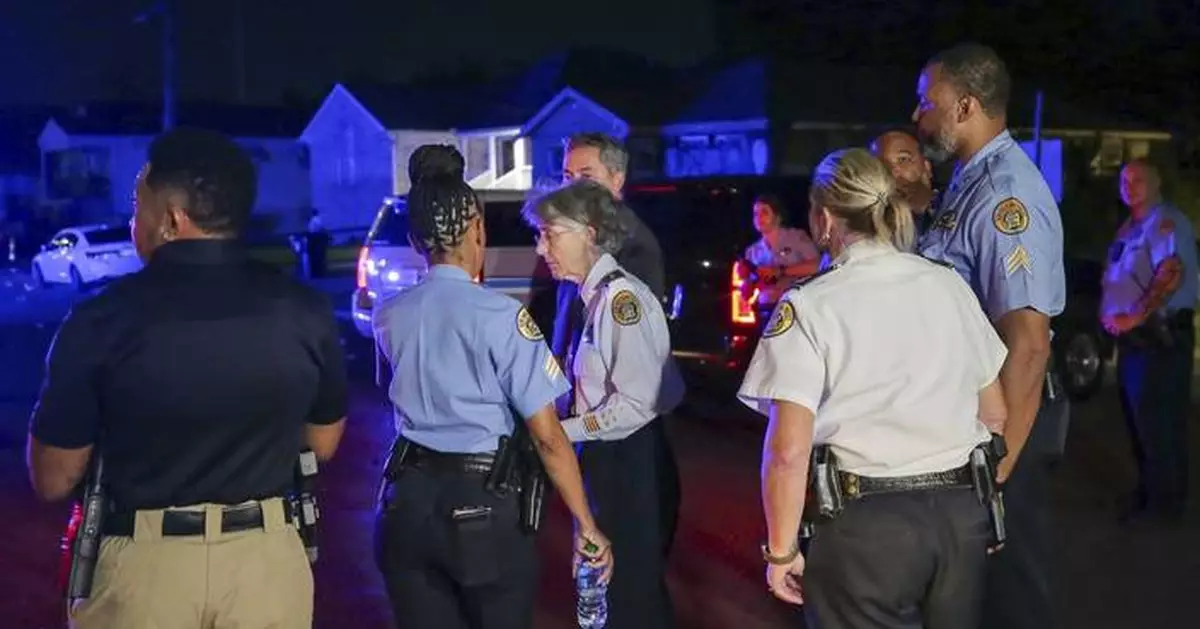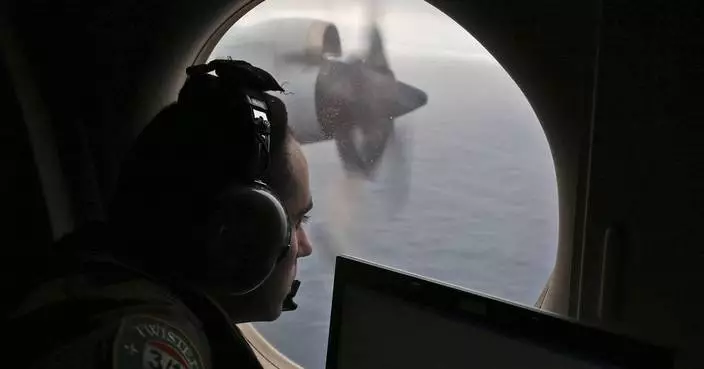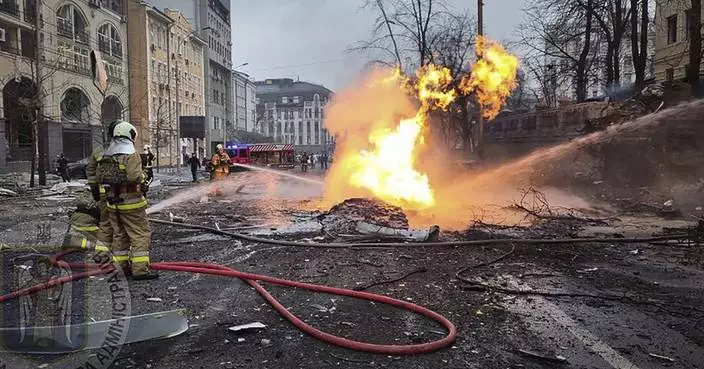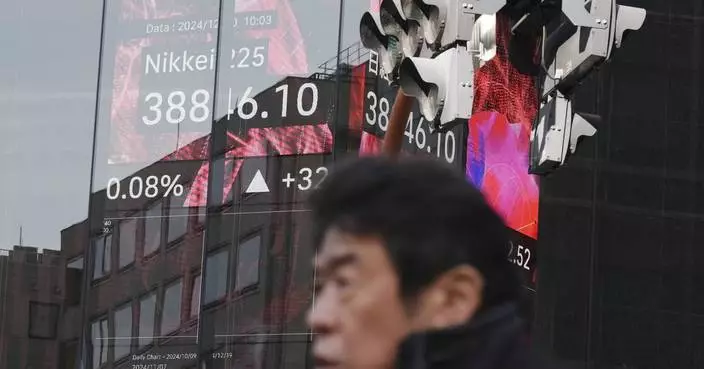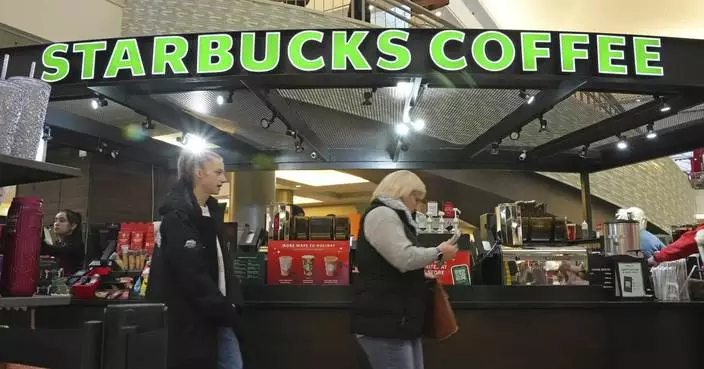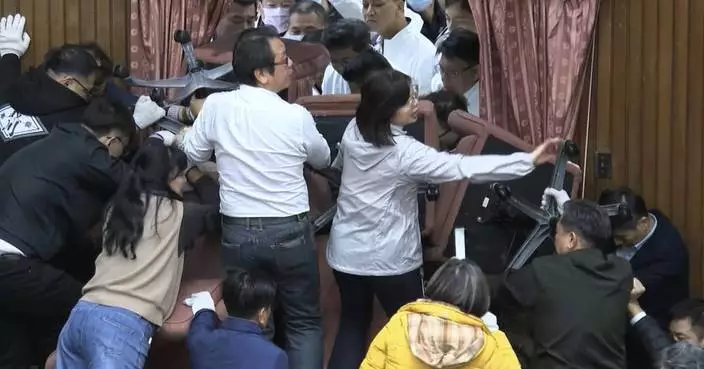NEW ORLEANS (AP) — New Orleans police arrested a man suspected in one of the mass shootings that broke out within one hour of each other during a large parade on Nov. 17, authorities said Wednesday.
The suspect, 32-year-old Alex Harris, and another person were arguing before the two opened fire on each other, injuring nine bystanders and Harris, according to a statement from the New Orleans Police Department. Harris was detained last week.
Harris, who police say had been on parole, faces charges of being a felon in possession of a firearm, illegal discharge of a firearm and reckless discharge of a firearm at a parade.
Police say they also arrested Tavi Roach, 36, shortly after the shooting as he attempted to flee in a stolen vehicle. He faces charges of theft and possession of a stolen vehicle and being a felon in possession of a firearm.
Earlier this month, police arrested another man, 19-year-old Curtis J. Gray, accused of gunning down an aspiring photographer and his uncle at the same parade about 45 minutes after the first shooting. He is being held on a $10 million bond, court records show.
The suspect’s mother, Ashley Gray, was also arrested and charged with being an accessory to second-degree murder in connection to the shooting. She is registered as owning the gun used in the shooting and police allege she colluded with her son to provide a false alibi for his whereabouts, WDSU reported.
Tanzanika Ruffin, an attorney representing Ashley Gray, declined to comment.
A representative for the Orleans Parish Public Defenders Office, which court records show represents Curtis J. Gray, Harris and Roach, said the office does not comment on pending cases.
A private attorney who previously represented Harris in a different case was unable to provide contact information for Harris' family and another private attorney previously representing Roach did not immediately respond to inquiries.
The parade, put on by the Nine Times Social Aid & Pleasure Club, was part of the beloved New Orleans tradition of “second-lines” in which crowds follow brass bands through the streets. These parades are an important part of the city's Black culture.
Additional arrests and charges are expected, police said.
Brook is a corps member for The Associated Press/Report for America Statehouse News Initiative. Report for America is a nonprofit national service program that places journalists in local newsrooms to report on undercovered issues. Follow Brook on the social platform X: @jack_brook96
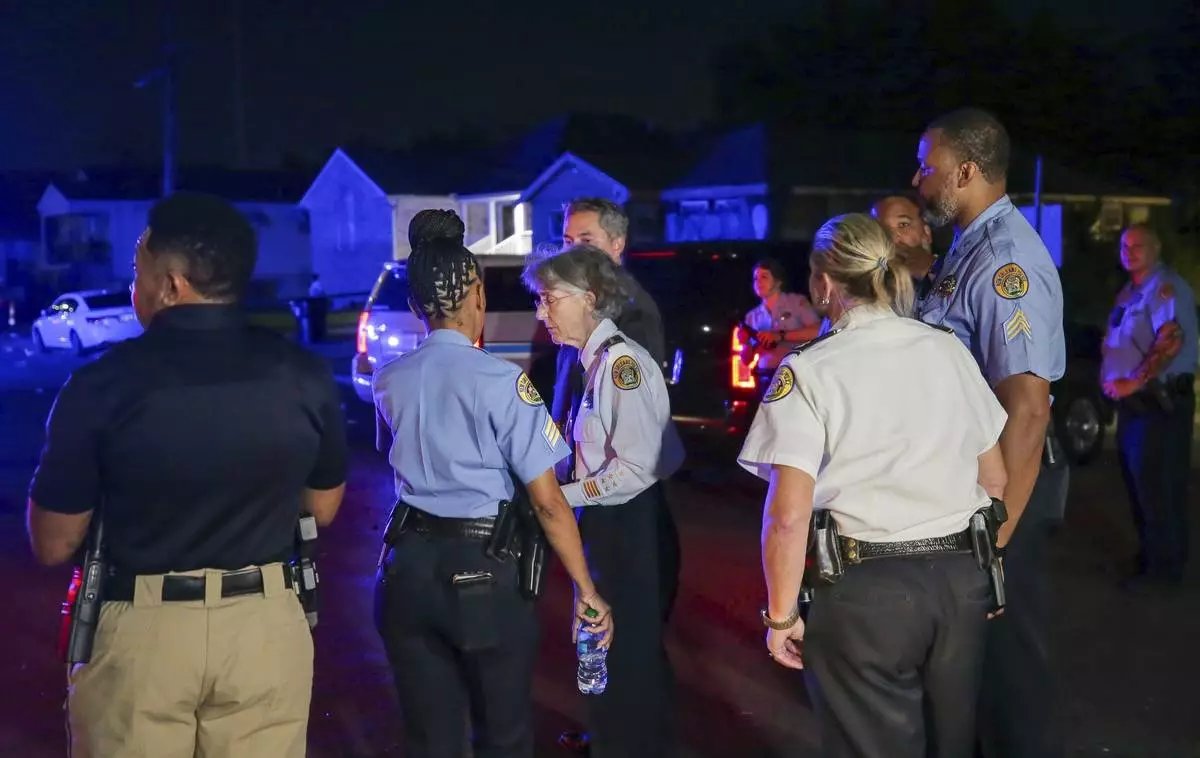
FILE - New Orleans Police Superintendent Anne Kirkpatrick, center, meets with officers after several people were killed and injured in a shooting in New Orleans, Nov. 17, 2024. (David Grunfeld/The Times-Picayune/The New Orleans Advocate via AP, File)
Drivers and airline passengers without reindeer and sleighs better make a dash for it: it's beginning to look like another record for holiday travel in the U.S.
The auto club AAA predicts that more than 119 million people will travel at least 50 miles from home between Saturday and New Year’s Day, which would top the previous holiday-season high set in 2019. The two weekends on either side of Christmas look to be some of the most crowded times on the road and at airports.
Trade group Airlines for America also foresees record travel, saying it expected U.S. airlines to carry 54 million passengers during a 19-day period that started Thursday and ends Monday, Jan. 6. The number would represent a 6% increase over last year.
A government shutdown that could start as soon as Saturday would likely be too close to the holidays to immediately affect flights and airport operations, but that might change if a shutdown dragged on.
Airlines expect to have their busiest days on Friday and Sunday, and on Dec. 26, Dec. 27 and Dec. 29. Flight traffic is expected to be light on both Christmas Day and New Year's Day. The slowest U.S. air-travel day this year — by a wide margin — was Thanksgiving Day.
The Transportation Security Administration expects to screen 40 million passengers over the holidays and through January 2.
About 90% of Americans traveling far from home over the holidays will be in cars, according to AAA.
“Airline travel is just really high right now, but most people do drive to their destinations, and that is true for every holiday,” AAA spokesperson Aixa Diaz said.
Gasoline prices are similar to last year. The nationwide average Thursday was $3.05 a gallon, down from $3.08 a year ago, according to AAA. Charging an electric vehicle averages just under 35 cents per per kilowatt hour, but varies by state.
Transportation-data firm INRIX says travel times on the nation’s highways could be up to 30% longer than normal over the holidays, with Sunday expected to see the heaviest traffic. Boston, New York City, Seattle and Washington, D.C., are the metropolitan areas primed for the greatest delays, according to the company.
Because the holiday travel period lasts weeks, airports and airlines typically have smaller peak days than they do during the rush around Thanksgiving, but the grind of one hectic day followed by another takes a toll on flight crews. And any hiccups — a winter storm or a computer outage — can snowball into massive disruptions.
That is how Southwest Airlines stranded 2 million travelers in December 2022, and Delta Air Lines suffered a smaller but significant meltdown after a worldwide technology outage in July caused by a faulty software update from cybersecurity company CrowdStrike.
Many flights during the holidays are sold out, which makes cancellations even more disruptive than during slower periods. That is especially true for smaller budget airlines that have fewer flights and fewer options for rebooking passengers. Only the largest airlines, including American, Delta and United, have “interline agreements” that let them put stranded customers on another carrier's flights.
This will be the first holiday season since a Transportation Department rule took effect that requires airlines to give customers an automatic cash refund for a canceled or significantly delayed flight. Most air travelers were already eligible for refunds, but they often had to request them.
Passengers still can ask to get rebooked, which is often a better option than a refund during peak travel periods. That's because finding a last-minute flight on another airline yourself tends to be very expensive.
“When they rebook you, they will pay for the fare difference. If my flight to visit grandma that I booked six months ago for $200 gets canceled, and I turn around and book a flight four hours from now for $400, I have to pay that difference,” said Sally French, a travel expert at consumer-affairs company Nerdwallet.
People traveling on budget airlines with fewer flights and no partnerships with other carriers may face a difficult choice in the event of a canceled flight.
“They will put you on the next outgoing Spirit or Frontier flight, but that could be a while from now. Sometimes waiting three days for that next flight is not going to work for you," and paying more to rebook on a big airline might be worthwhile, French said.
Some airlines are taking advantage of a provision in the new Transportation Department rule that defined a significant delay as three hours for a domestic flight and six hours for an international flight. According to Brett Snyder, who runs the Cranky Flyer website, airlines that previously issued refunds for shorter delays — Delta, United and JetBlue, for example — are now using the government standard.
Delayed flights increase the risk that bags will get lost. Passengers who get separated from their bags should report it to the airline and ask what the airline will cover. Links to the customer-service plans of major U.S. airlines are at the bottom of this page.
A government shutdown could occur if Congress doesn’t pass a funding bill with a midnight Friday deadline. Most TSA workers at airports, air traffic controllers and customs agents are considered essential and would be required to work without pay in the event of a shutdown.
More uncompensated workers might call out sick the longer a shutdown lasts, which could lead to longer security lines and other delays. That appeared to be the case several weeks into a government shutdown that started in December 2019.
"While our personnel have prepared to handle high volumes of travelers and ensure safe travel, an extended shutdown could mean longer wait times at airports,” TSA spokesman Carter Langston said in a statement.
AAA advises travelers to “continue with their holiday plans, even if the shutdown materializes,” spokesperson Diaz said. “Airport operations will continue as normal, but perhaps run a bit slower than usual, so travelers should be aware of that.”
Airline fares were up 4.7% in November, compared with a year earlier, according to U.S. government figures. But early 2025 is a good time to start planning next year's trips, including for spring breaks and summer vacations.
“Because travel is so popular, you're not going to find anything that feels very rock-bottom, but January and February are great times to plan for March, April and May,” Laura Motta, an editor at travel-guide publisher Lonely Planet, said. “If you want to go to Paris in the spring, you need to be thinking about that in January."
AP Reporters Mae Anderson in Nashville, Tennessee, and Mike Pesoli in Washington, D.C., contributed to this report.
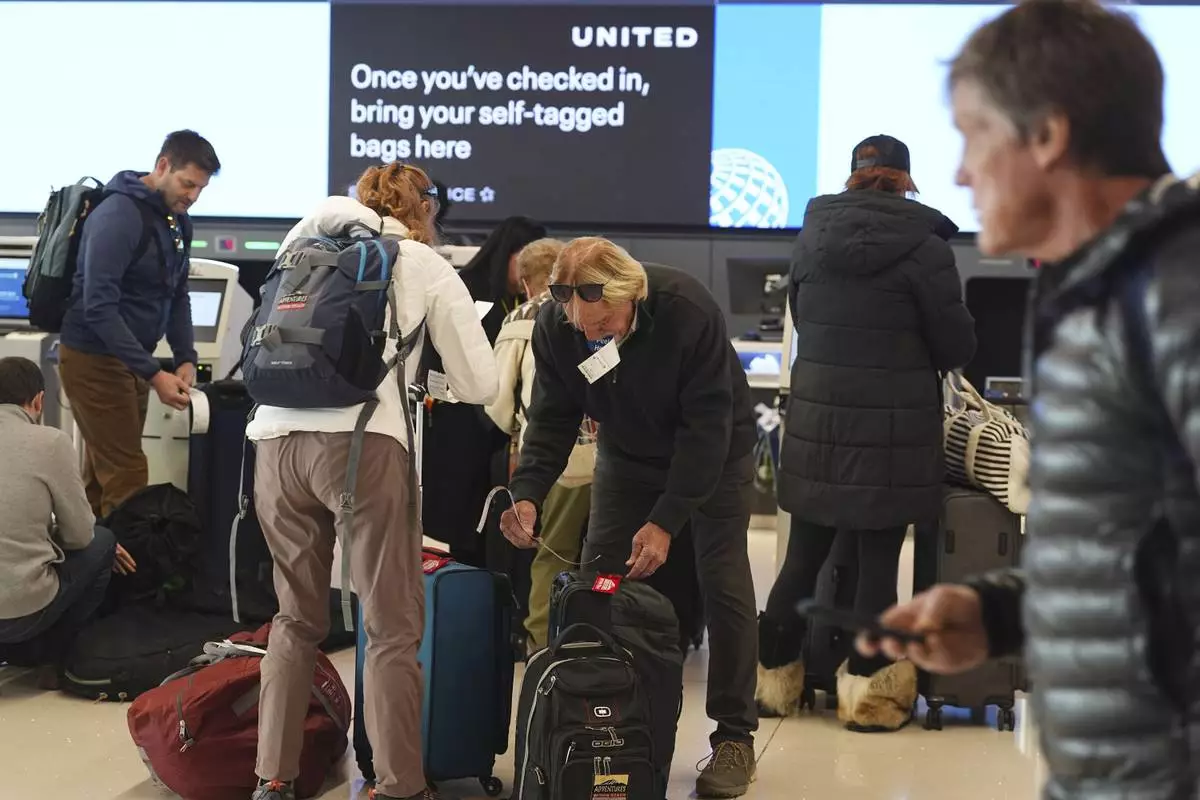
Travelers attach tags to their bags after checking in at the United Airlines counter at Denver International Airport, Saturday, Dec. 14, 2024, in Denver. (AP Photo/David Zalubowski)
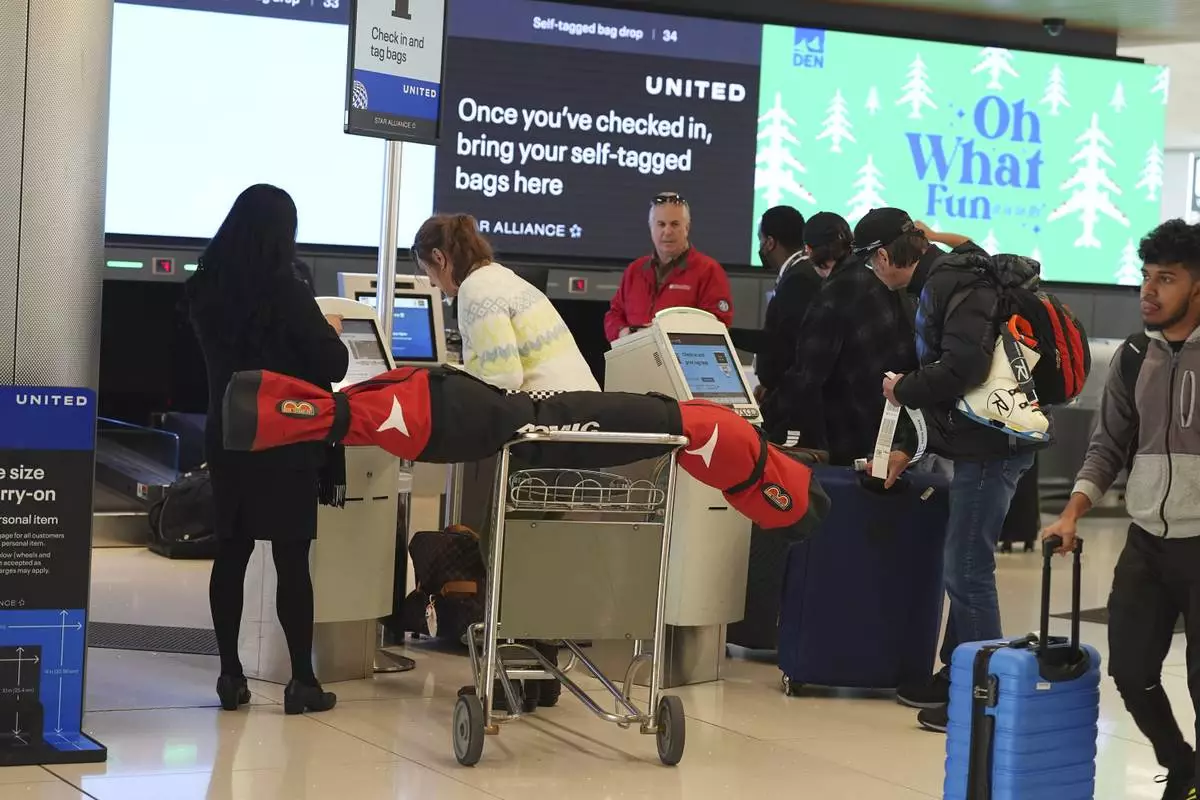
Passengers use the self-check kiosks to get boarding passes for United Airlines flights at Denver International Airport, Saturday, Dec. 14, 2024, in Denver. (AP Photo/David Zalubowski)

Dressed in holiday garb, Leo, a 7-year-old Australian Shepherd/Heeler mix, greets passengers at Denver International Airport as part of the canine airport therapy squad Saturday, Dec. 14, 2024, in Denver. (AP Photo/David Zalubowski)
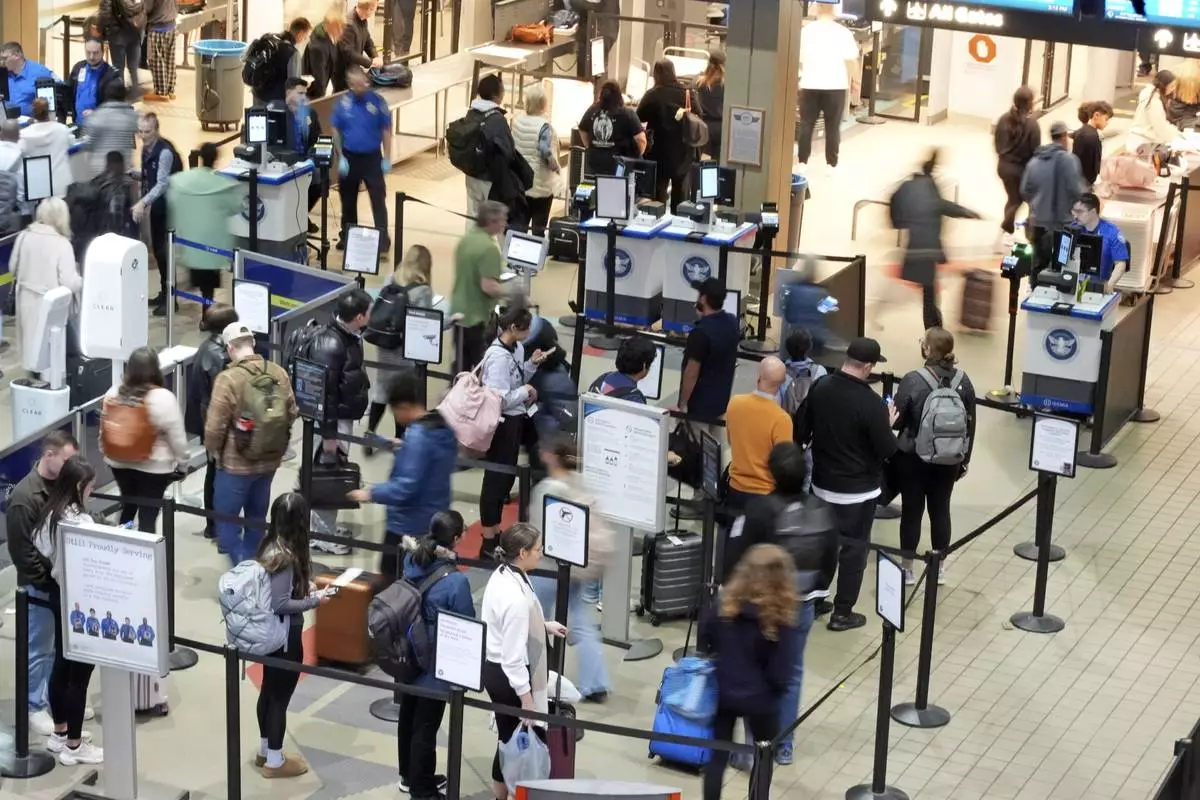
FILE - Passengers line up at the security checkpoint in Pittsburgh International Airport Dec. 11, 2024. (AP Photo/Gene J. Puskar, File)



